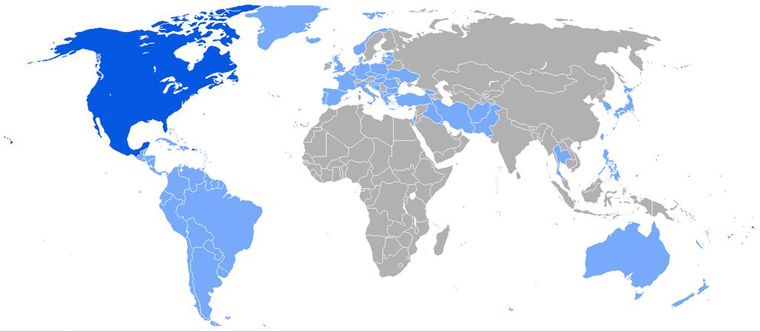
We live in an accelerated age, one in which each change hastens the next. It may seem like the world is moving faster, but it is really karma that is accelerating. Karma is simply the law of cause and effect, and as the causes increase in speed so do their effects. And amid the distraction and flurry of such rapid change, it’s easy to lose sight of greater fundamental shifts underlying the clutter of our lives.
When the Soviet Union collapsed, some Americans believed that we had entered a unipolar age of the single superpower able to extend its influence and might across the globe indefinitely. To the contrary, the United States now finds itself spending billions in a global war while both China and the European Union, without the financial burden of maintaining a worldwide military presence, are quickly consolidating relationships with other regions, effectively leaving the U.S. out in the cold. The Euro’s increased value against the dollar has contributed to our financial uncertainty. Events like the sub-prime mortgage crisis highlight the fragility of our economy.
In every age there have been empires – superpowers that flexed muscles and expanded influence and control across borders and oceans. Some lasted for many hundreds of years, while others endured for shorter periods. What is undeniable, however, is that all empires decline and that in time even the most powerful cannot maintain supremacy. As we look at the decline of empires, certain characteristics repeatedly arise. Historian Morris Berman has documented a consistent pattern of decline, and its signs indicate that fundamental change is in the offing.
Sign one: Accelerating social and economic inequality. In common parlance, this includes the shrinking and disappearance of the middle class and the accumulation of wealth into an ever-smaller number of hands. The growing lower class becomes a permanent underclass, racked by crime and disease.
Sign two: Declining investment. This results in decaying infrastructure due to lack of investment in its rehabilitation and replacement, erosion of manufacturing capacity and the coincident disenfranchisement of labor and employment benefits.
Sign three: Reduced literacy, critical thinking skills and intellect. Education, shortchanged of funds, results in declining academic skills, depriving society of future leaders and innovators and producing a poorly motivated workforce focused on entertainment and purely material gain.
Sign four: Spiritual emptiness. Virtue and ethics are replaced with greed and fear as primary motivators. Addictive behaviors focused on drugs, alcohol, sex and gambling proliferate while community cohesion declines.
These common signs of decline are not particularly associated with an empire’s technological advancement nor form of government. Historically, signs such as these are observed in the decline of all empires, whether Roman, Chinese, English, Russian or, dare I say, American.
America is facing a difficult period of transition. Empire decline does not mean cultural extinction; England, for example, is still a major economic force, but no longer an empire. The United States has had a very successful past century, but in this day and age of accelerated karma, that is a very long time. The challenge for America now is to honestly recognize its strengths and weaknesses, and begin to plan for a new and entirely different role in the world. With luck, we might just find that the end of empire’s not so very bad after all.